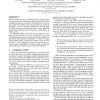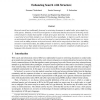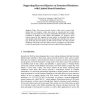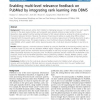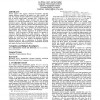131
click to vote
CIKM
2011
Springer
14 years 2 months ago
2011
Springer
Large knowledge bases consisting of entities and relationships between them have become vital sources of information for many applications. Most of these knowledge bases adopt the...
134
click to vote
SIGMOD
2011
ACM
14 years 4 months ago
2011
ACM
With the proliferation of geo-positioning and geo-tagging, spatial web objects that possess both a geographical location and a textual description are gaining in prevalence, and s...
143
click to vote
DEBU
2010
15 years 2 months ago
2010
Keyword search has traditionally focussed on retrieving documents in ranked order, given simple keyword queries. Similarly, work on keyword queries on structured data has focussed...
116
click to vote
COMAD
2008
15 years 3 months ago
2008
This paper illustrates a strange property that was encountered when analysing keyword query data. The objective of this work was to observe the temporal properties of keyword quer...
127
click to vote
DASFAA
2010
IEEE
15 years 6 months ago
2010
IEEE
xml keyword search provides a simple and user-friendly way of retrieving data from xml databases, but the ambiguities of keywords make it difficult to effectively answer keyword qu...
126
click to vote
DEXA
2003
Springer
15 years 7 months ago
2003
Springer
: We demonstrate an approach to transform keyword queries automatically into queries that combine keywords appropriately by boolean operations, such as and and or. Our approach is ...
115
click to vote
CIKM
2007
Springer
15 years 8 months ago
2007
Springer
In this paper, we study the problem of effective keyword search over XML documents. We begin by introducing the notion of Valuable Lowest Common Ancestor (VLCA) to accurately and ...
112
click to vote
DASFAA
2008
IEEE
15 years 8 months ago
2008
IEEE
Many Web sources provide forms to allow users to query their hidden data. For instance, online stores such as Amazon.com have search interfaces, using which users can query informa...
144
click to vote
CIKM
2009
Springer
15 years 8 months ago
2009
Springer
Background: Finding relevant articles from PubMed is challenging because it is hard to express the user’s specific intention in the given query interface, and a keyword query ty...
133
click to vote
CIKM
2009
Springer
15 years 8 months ago
2009
Springer
Search engines that support structured documents typically support structure created by the author (e.g., title, section), and may also support structure added by an annotation pr...

